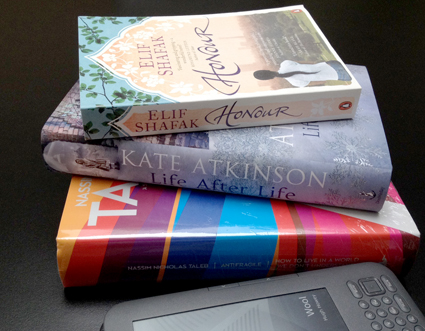Arthur C Clarke Award #3: ‘Angelmaker’ by Nick Harkaway
Nick Harkaway’s sprawling yarn Angelmaker starts out in present-day London and brings together two characters who are an unlikely SF duo. Joe is the son of a gangster and Edie is an octogenarian female spook. She’s ever vigilant with her bags packed, waiting for her past to pay a visit. Which it does.
Joe Spork leads an impecunious life having shunned a life of crime despite his first-class underworld connections. Instead he follows his grandfather’s trade – fixing clocks and Victorian automata. The relationship between the three generations of Sporks, is explored by jumping back and forth in time, providing some of the best writing in the novel. Harkaway also writes well about Joe’s relationship with technology:
Joshua Joseph has no great hatred of modern technology – he just mistrusts the effortless, textureless surfaces and the ease with which it trains you to do things in the way most convenient to the machine. Above all, he mistrusts the duplication. A rare thing becomes a commonplace thing. A skill becomes a feature. The end is more important than the means. The child of the soul gives place to a product of the system.
Joe’s and Edie’s lives collide when he is asked to fix what turns out to be a doomsday machine. His life is then in peril as a sect of mad-monk ‘Ruskinites’ attempt to retrieve the machine and deploy it for their own evil purposes. And arching over this story are Edie’s previous espionage encounters with a Moriarty-style villain, Shem Shem Tsien.
If you like a SF novel that’s replete with tangential narratives then Angelmaker might be your preference for the Arthur C Clarke Award 2013. In the final 25% of the novel there are fewer asides and the pace picks up. I’d be the first to say that pace isn’t everything but the diversions in Angelmaker did, for me, feel draining.
In the first 25% of the novel, I was perplexed by Harkaway’s descriptions of female characters (even though they were minor characters). For example: ‘a bubbly, bounteous American woman’ and ‘a bubbly forty-something called Joyce, whose considerable cleavage…’ Coupled with a surprisingly adolescent tone when writing about Edie as a young woman, I decided that I probably stood outside the natural reader-catchment for this novel.
Angelmaker is regarded as science fiction in a wider understanding of the genre. It’s a surreal mix of spy thriller, gangster comedy and urban fantasy and its inclusion in the shortlist shows that the Arthur C Clarke Award is outward looking, which is a good thing.
Arthur C Clarke Award: Shortlist So Far
With three books down, and three to go, I personally see Chris Beckett’s Dark Eden running well ahead or Nick Harkaway with Angelmaker and Adrian Barnes with Nod.
Next: Intrusion by Ken MacCleod





Leave a Reply
Want to join the discussion?Feel free to contribute!